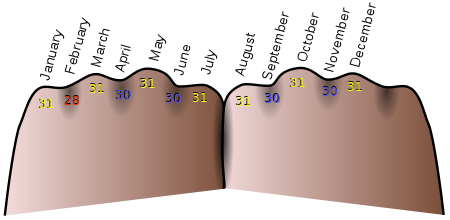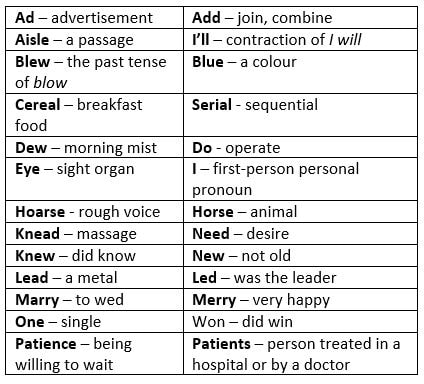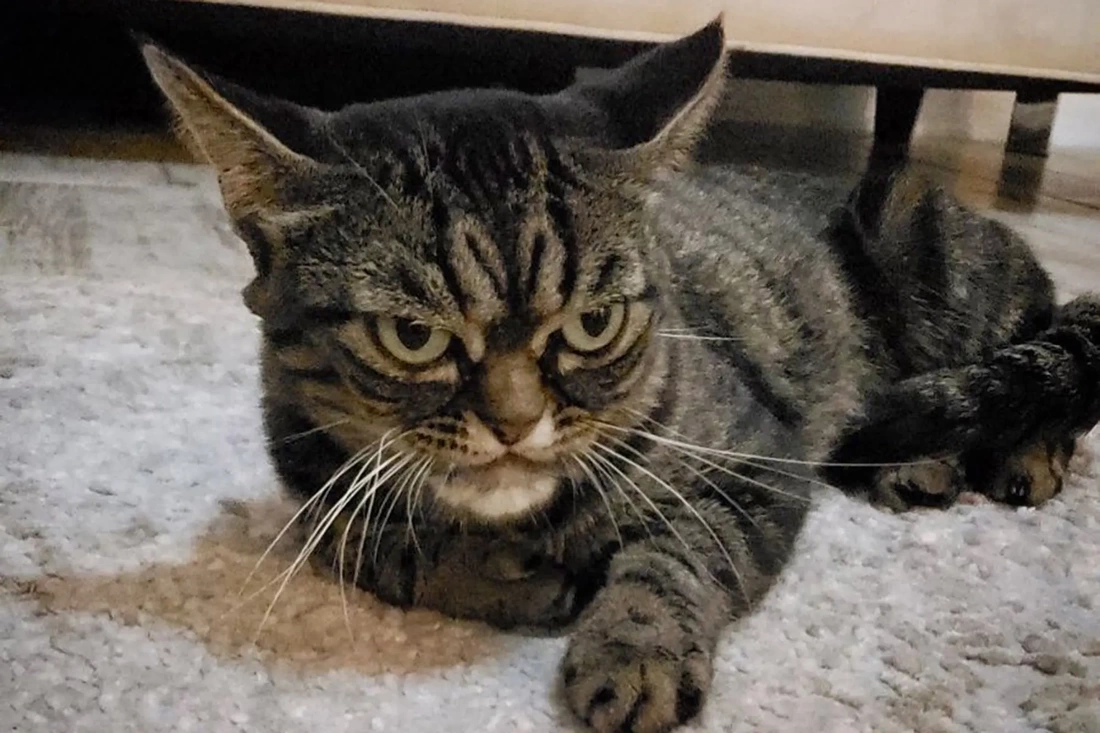- A way to remember the Great Lakes? HOMES: Huron, Ontario, Michigan, Eric, Superior
- The order of operations in math? PEDMAS or BEDMAS: Parentheses/Brackets, Exponents, Division, Multiplication, Addition, Subtraction
- The order of the planets from the Sun? My Very Educated Mother Just Served Us Nine Pizzas (but I guess it’ll have to be changed to My Very Educated Mother Just Served Us Nachos!): Mercury, Venus, Earth, Mars, Jupiter, Saturn, Uranus, Neptune (Pluto)
- Trying to remember the order of colours in a rainbow? ROYGBIV: Red, Orange, Yellow, Green, Blue, Indigo, and Violet
- Trying to remember which months have 31 days? Use your knuckles!
|
We likely have all used a mnemonic technique at least one in our life. In short, a mnemonic (the first ‘m’ is silent) is a technique to memorize and retain information. There are tons of examples. I will share a few I have used: Do you have any other cool mnemonics to share?
0 Comments
Homophones are words that sound the same but are often spelled differently. Examples include: Know of any others? Please share in the comments.
 Funny thing about words – you’ll find some of them SOUND the same, but actually have different spellings and meanings. These are called Homophones. Because homophones can sometimes cause some confusion, I thought it best to address one set here. Check out my post on Homophones for more. Elusive is an adjective that means “difficult to find or capture.” Example: Somehow the mice keep eluding the traps I’ve set in the basement. They are being elusive. Illusive is an adjective that describes something as misleading or deceptive. Example: If you see a unicorn in your backyard, you might want to double check if you’ve been drugged. You can describe that vision as illusive. Allusive is an adjective that describes when someone is making implied or indirect references. Example: When speaking to others about how my little cat Alfie passed away, I allude to her poor health. I am being allusive. Let’s look at the photo. Here we have a cute little furball that is hiding from a giant monster.
 In deciding what I could write about this month, I came across an interesting. Now what I’m about to say sounds like something from the book, The Hitchhikers Guide to the Galaxy, but this is not fiction. The IBM supercomputer at the University of Reading, known as ThamesBlue, has been around for more than a decade now. Before it arrived, it took an average of six weeks to perform a computational task such as comparing two sets of words in different languages, now these same tasks can be executed in a few hours. And what did scientists discover? They discovered that 'I', 'we', 'who' and the numbers '1', '2' and '3' are amongst the oldest words, not only in English, but across all Indo-European languages. The Indo-European languages are most of those originally found across Europe, the Middle-East and the Indian subcontinent. Examples include Celtic, Roman, Greek, Germanic, Nordic (with the exception of Finnish), Slavic, Armenian, Iranian, Afghan, Gujarati, Hindi, Bengali, Napali and Kashmiri, modern-day derivations such as English and Spanish. Researchers call words that persist relatively untouched across the ages 'cognates’. The most resilient cognates, the numerals, have not changed significantly in their entire history. Pretty cool stuff, eh?  This cat is involved in some very illicit activities. This cat is involved in some very illicit activities. Elicit and illicit are two words that are often confused because of their similar sounds, but they have different meanings. Elicit is a verb that means to evoke or draw out a reaction or response from someone. Example: She was trying to elicit a confession from me. Illicit is an adjective that describes something that is illegal - not permitted by laws, rules, or customs. Example: They were selling drugs at the concert. Those are illicit activities so they were kicked out of the venue. How to remember? Illicit and illegal both start with the letter i.  Piece and peace are homophones: two words that sound the same despite their different meanings. Piece is a noun and means a part or portion of something. It could also refer to a single item that is part of a larger set or collection. Examples: I would like a piece of triple chocolate cake. Do we have all the pieces to play a proper game of chess? Piece can also be used as a verb and refers to the act of putting something together or completing something. Example: I was able to piece together the clues to know who the bad guy was in the movie. Peace is also a noun, and means a state of calm or tranquility. Examples: I wish the two counties would sign a peace treaty. Their ongoing war is outrageous. I often find inner peace just by snuggling my cute kitty cats. Homophones can be tricky, so it’s important to double-check your writing to ensure that you are using the correct word. I was scrolling through TikTok and learned something! I, like the man in the video, thought for some reason, that penultimate meant the greatest.
We were both wrong – although the man in the video learned in kind of an embarrassing way. Penultimate means “next to last” or “second to last.” It's probably because it adds an emphatic extra syllable to the word ultimate that people think it somehow means “more” than ultimate—but it really means less. Watch the video now: https://www.tiktok.com/@drbradysmith/video/7267208007870696746.com  “Quiet” and “quite” are two words that are often confused with each other. They are spelled and pronounced differently, and have different meanings. Quiet is an adjective that means “making little or no noise”. It describes the absence of noise or sound. Example: I enjoy camping because I'm free from all the noise and sounds of the city. It’s quiet. Quite is an adverb that means “to a considerable extent or degree”. It modifies or emphasizes a statement. Example: I quite enjoy camping because I love the absence of digital technology. "But" is a coordinating conjunction. "However" is a transition word. In these instances of use, they are similar – they link two independent clauses together and are used to introduce a contradiction. This was discussed in part 1 of this two-part series.
However and But have some distinct meanings of their own, too. This is what we’ll explore in part 2. However can be used to mean ‘by whatever means, condition, or state’. Example: I will get there however I can. But can also be used to mean ‘with the exception that/of’. Example: I like all cats but this one. I think it wants to kill me.  We may have lost the fight, but we haven't lost the battle! We may have lost the fight, but we haven't lost the battle! In part 1 of ‘However’ vs. ‘But’, we’ll look at when they have similar meanings - to indicate a contradiction. Most of the time they can be used interchangeably, with a few minor changes in punctuation. Most of the time. Let’s explore. ‘However’ as an adverb is a transition word. This means that it is used to connect to independent clauses. When used, it must be separated from the rest of the sentence with a comma. This can occur is a few ways: Example: I love to travel. However, it requires time and money. (Two sentences. ‘However’ introduces the second sentence. Must use a comma after use). I love to travel; however, it requires time and money. (Two independent ideas separated by a semi-colon. Must use a comma after use). I love to travel. It requires time and money, however. (Two sentences. Must use a comma before use). ‘But’ is a coordinating conjunction - a structure often used to connect ideas that contrast each other. Other examples of coordinating conjunctions are ‘Or’ and ‘And’. Commas are often used to separate longer or more complicated clauses. Shorter pairs of clauses are often connected without commas. Example: I love to travel but it requires time and money. Some more examples of when these words can be used interchangeably because of their purpose - to indicated contrast:
We’ll explore the other uses of ‘However’ and ‘But’ in our next post.  Contrary to what you may believe at first, thirst traps have no relation to water. It refers to a viewer's "thirst", a colloquialism likening sexual frustration to dehydration, with the afflicted individual being described as "thirsty”. The usage of the phrase derived from selfie culture. A thirst trap is a sensual photograph intended for social media to catch a viewer’s eye. 👀 But, more than anything, a thirst trap is all about being confident — because as we know, there's nothing hotter than being your authentic self. 💖  The cat dressed formally to attend the wedding. Formerly, he was in his pj's. The cat dressed formally to attend the wedding. Formerly, he was in his pj's. Formerly is an adverb. It means something that happened before. Previously. Example: I had formerly been a teacher. Now I work in Strategic Communications. Formally is also an adverb. It means something that is official. Officially. Example: I’m going to a wedding this Friday. My husband and I will both be formally dressed. If it’s difficult to remember, just think of the root. Formerly = former Formally = formal  Envelop and envelope are the same word in different grammatical forms. Because of this, they are also pronounced differently. Let’s explore. Envelop is a verb meaning to cover or surround something completely. Pronunciation wise, the accent is on the second syllable. Example: The long dress was too big for her. It enveloped her completely. (note that the simple past adds an ‘ed’ to Envelop, making it look even more like Envelope.) Envelope is a noun meaning a paper covering for documents sent by mail. Pronunciation wise, the accent is on the first syllable. Example: I received an envelope in the mail last week. For once, it wasn’t a bill. Enveloppe is the French word for envelope. Living in Canada and being bilingual in both of its official languages, English and French, I often forget which is which until spellcheck tells me otherwise. That’s only helpful if I’m writing on a digital platform. Sadness. Do you have any tricks to share to remember the difference? Asking for a friend. 😉 Both allude and elude are verbs that sound similar, but their meanings are completely different.
Allude is used when someone suggests, calls attention to, or hints at something indirectly. Example: From just a sorrowful look in her eyes, Beverly alluded to the fact that Jack was indeed Jean-Luc’s son. It had been kept secret for 20 years. Elude means to evade or escape from a danger (perceived or real), an enemy, or pursuer, typically in a skillful or cunning way. Example: The crew of the ship was forced to elude the enemy named Vadic or risk being annihilated. The trick I use to remember the difference? Evade and Escape, similar in meaning to Elude, both start with an “e”. Hopefully that helps!  The cat stuffed herself into a glass bowl The cat stuffed herself into a glass bowl I’ve observed some confusion over which to use (into or in to) when writing. Time to clarify! Into – This is a preposition and indicates movement. Example: I walked into the building. In to – These two words are also prepositions. “In” can be used to create phrasal verbs. “To” is often used when creating the infinitive (to + verb). Both are used frequently but are not normally paired together. Example: I learned to drive in 2011. (This is an example of the infinitive) My cats get to play outside in our yard. When it’s time for my cats to come in, I ring a bell and they run inside. (This is an example of a phrasal verb) The simple trick: If you’re describing something that involves movement, use into. |
Categories
All
Archives
June 2023
References
Azar-Hagen Grammar series AuthorDisciplined English grammar geek and former language consultant providing free assistance to all in |





 RSS Feed
RSS Feed